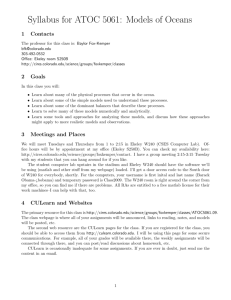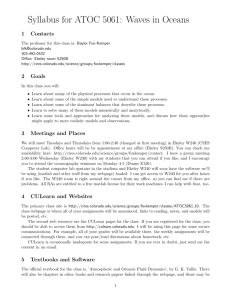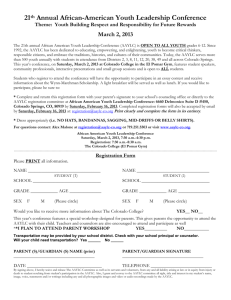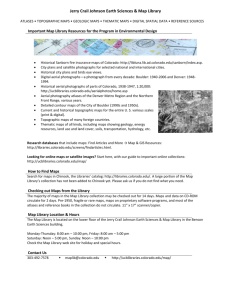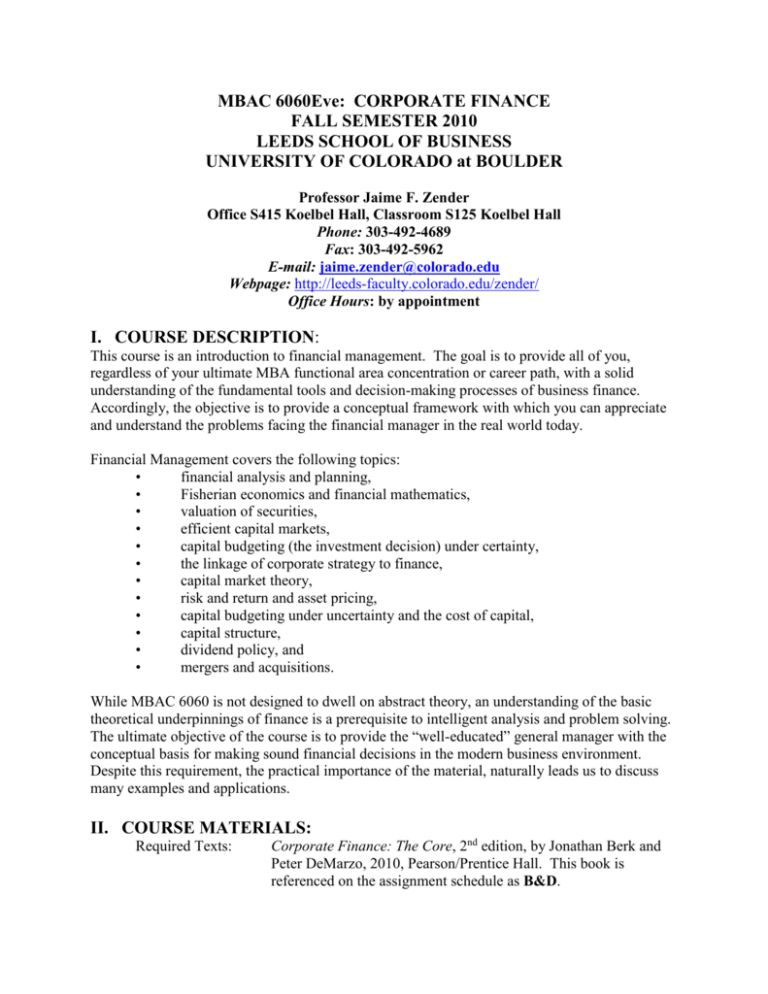
MBAC 6060Eve: CORPORATE FINANCE
FALL SEMESTER 2010
LEEDS SCHOOL OF BUSINESS
UNIVERSITY OF COLORADO at BOULDER
Professor Jaime F. Zender
Office S415 Koelbel Hall, Classroom S125 Koelbel Hall
Phone: 303-492-4689
Fax: 303-492-5962
E-mail: jaime.zender@colorado.edu
Webpage: http://leeds-faculty.colorado.edu/zender/
Office Hours: by appointment
I. COURSE DESCRIPTION:
This course is an introduction to financial management. The goal is to provide all of you,
regardless of your ultimate MBA functional area concentration or career path, with a solid
understanding of the fundamental tools and decision-making processes of business finance.
Accordingly, the objective is to provide a conceptual framework with which you can appreciate
and understand the problems facing the financial manager in the real world today.
Financial Management covers the following topics:
•
financial analysis and planning,
•
Fisherian economics and financial mathematics,
•
valuation of securities,
•
efficient capital markets,
•
capital budgeting (the investment decision) under certainty,
•
the linkage of corporate strategy to finance,
•
capital market theory,
•
risk and return and asset pricing,
•
capital budgeting under uncertainty and the cost of capital,
•
capital structure,
•
dividend policy, and
•
mergers and acquisitions.
While MBAC 6060 is not designed to dwell on abstract theory, an understanding of the basic
theoretical underpinnings of finance is a prerequisite to intelligent analysis and problem solving.
The ultimate objective of the course is to provide the “well-educated” general manager with the
conceptual basis for making sound financial decisions in the modern business environment.
Despite this requirement, the practical importance of the material, naturally leads us to discuss
many examples and applications.
II. COURSE MATERIALS:
Required Texts:
Corporate Finance: The Core, 2nd edition, by Jonathan Berk and
Peter DeMarzo, 2010, Pearson/Prentice Hall. This book is
referenced on the assignment schedule as B&D.
Analysis for Financial Management, 9th edition, by Robert C.
Higgins, 2009, Irwin/McGraw-Hill. This book is referenced on the
assignment schedule as HIG. Higgins writes in an applied, “user
friendly” format for practicing financial managers. While not
providing comprehensive coverage of some finance topics, and not
emphasizing the required theory, the book provides reinforcement
and additional intuition to more standard finance texts. While
“non-finance” types may sell their B&D text at the conclusion of
the course, I strongly recommend that all students keep the Higgins
text for future reference; it is indispensable for any manager.
Cases:
There is also a small packet of Harvard cases.
Webpage:
You will find various teaching notes, slides, and assignments at:
http://leeds-faculty.colorado.edu/zender/ or “MyLeeds.”
III. COURSE POLICIES:
As mentioned above, MBAC 6060 is an ambitious course. Most past students, at a variety of
universities, have considered the core finance class to be the most difficult course in the first year
of their MBA program. The pace is necessarily swift and mastery of the material is timeconsuming. Experience has shown that students who get behind are seldom able to recover.
Therefore, a strong and continuing time commitment is necessary. Please read the following
course policies carefully! I will not deviate from these policies except under extreme
circumstances!
Your grade will be determined as follows:
Midterm Exam
30%
Comprehensive Exam
40%
Cases and homework
30%
October 19th
December 14th
See course schedule
Exams will likely contain a mixture of essay questions, problems, and, perhaps, even some
multiple-choice questions. All material covered in the lectures, readings, and assignments will
be fair game for the exams. To stress your mastery of concepts rather than your memory, you
may bring one 8-1/2 by 11 inch sheet of paper (one sided) containing your personal notes,
important equations, favorite quotes, etc, to each exam. A typewritten page is acceptable.
No "makeup" exams will be given unless they are arranged for in advance of the examination
date! If you miss the midterm exam (due to an emergency only, this is not an option you may
elect) your grade will be determined by the cases and the final exam. The final exam must be
completed in order to pass the course! Students who wish to appeal their score on any exam
must submit the exam and a brief discussion in writing on why a different grade is warranted.
Any appeal to an exam grade must be delivered to me no later than one week following the date
the exam is returned. Furthermore, I reserve the right to re-grade all questions on the exam (I
make errors in being too generous as well as too stingy!).
The Harvard Cases and the Wasatch Electronics case are to be written up and handed in, one per
2
group. Limit yourselves to 2-3 pages of discussion plus any supporting tables you wish to attach.
Class participation is an important indication of daily preparedness. Thoughtful feedback from
you facilitates the learning process and makes classes lively and interesting. Good questions are
an important form of participation. Come to class prepared to ask and answer questions posed
by your classmates or myself. While I do not formally grade class participation it is an important
part of the learning process and I expect each student to participate for the benefit of all.
Homework assignments are provided for most of the readings. The assignments are structured to
reinforce the major themes of the class for that day, and to illustrate the types of problems you
can expect to find on the exams. These assignments will not be collected rather you will
complete the assignments at myfinancelab.com (see the schedule for instructions for registering).
To get the most out of class, and ensure you keep up with the swift pace, you should carefully
read the assigned chapters and attempt at least some of the problems before the corresponding
lecture. The homework assignments are designed as individual assignments however you may
benefit from working on them in small groups. In order to allow you to manage your time in as
flexible a manner as possible, I do not require that you complete homework assignments on the
day they are listed on the schedule. I only require that the assignments for chapters 3 through 9
be completed prior to the time of the Midterm exam and for chapters 10 through 19 be completed
prior to the time of the Final exam.
Professionalism is expected! I have a zero tolerance policy for plagiarism or cheating.
Many of the cases and homework assignments have been used before and I caution you
that it is a violation of the Honor Code to receive any unauthorized assistance in
completing these assignments. To be clear, outside of assistance from the members of your
group or me, no assistance is authorized. Other than for use directly related to the lecture
please do not use your laptops for connection to the internet, E-mail, or messaging during
class. Such behavior is detrimental to the learning environment for those around you.
IV. LECTURE NOTES:
The lecture notes are posted on the course web page as well as lecture modules 1 – 19. Please be
advised that reading these notes should not be viewed as a substitute for attending class and
carefully taking your own notes. The lecture modules were developed by me and a former
colleague (Ron Lease) in order to provide a different presentation of the material than that given
in class. This is an attempt to acknowledge that for every student there is a different way to
present the material that will make it most understandable, and so the more ways I can present
the material the better. While the modules are designed to cover most of the highlights of the
lectures, many of the more subtle points are "fleshed out" in the lectures and as a result of
questions that come up in class, or alternative ways that I find to explain the materials in "real
time." In combination, by carefully reading the chapters, reviewing your own comprehensive
class notes, reviewing the slides and the “posted” lecture modules, and working and
understanding the end-of-chapter problems, cases, and other assignments, you should obtain an
in-depth understanding of the materials in corporate finance.
V. COMMUNICATION:
I will be communicating with the class as a whole via MyLeeds.
3
VI. OTHER IMPORTANT ISSUES:
If you qualify for accommodations because of a disability, please submit to me a letter from
Disability Services in a timely manner so that your needs may be addressed. Disability Services
determines accommodations based on documented disabilities. Contact: 303-492-8671, Willard
322, and www.Colorado.EDU/disabilityservices
I will make every effort to provide accommodation for students who, because of religious
obligations, have conflicts with scheduled exams or assignments. The schedule for these
requirements is on the course webpage. Please notify me in advance of any such conflict so that
we may devise an appropriate solution. http://www.colorado.edu/policies/fac_relig.html
Students and faculty each have responsibility for maintaining an appropriate learning
environment. Students who fail to adhere to such behavioral standards may be subject to
discipline. Faculty have the professional responsibility to treat all students with understanding,
dignity and respect, to guide classroom discussion and to set reasonable limits on the manner in
which they and their students express opinions. Professional courtesy and sensitivity are
especially important with respect to individuals and topics dealing with differences of race,
culture, religion, politics, sexual orientation, gender variance, and nationalities. Class rosters are
provided to the instructor with the student's legal name. I will gladly honor your request to
address you by an alternate name or gender pronoun. Please advise me of this preference early in
the semester so that I may make appropriate changes to my records. See polices at
http://www.colorado.edu/policies/classbehavior.html and at
http://www.colorado.edu/studentaffairs/judicialaffairs/code.html#student_code
The University of Colorado at Boulder policy on Discrimination and Harassment
(http://www.colorado.edu/policies/discrimination.html, the University of Colorado policy on
Sexual Harassment and the University of Colorado policy on Amorous Relationships applies to
all students, staff and faculty. Any student, staff or faculty member who believes s/he has been
the subject of discrimination or harassment based upon race, color, national origin, sex, age,
disability, religion, sexual orientation, or veteran status should contact the Office of
Discrimination and Harassment (ODH) at 303-492-2127 or the Office of Judicial Affairs at 303492-5550. Information about the ODH and the campus resources available to assist individuals
regarding discrimination or harassment can be obtained at http://www.colorado.edu/odh
All students of the University of Colorado at Boulder are responsible for knowing and adhering
to the academic integrity policy of this institution.
Violations of this policy may include: cheating, plagiarism, aid of academic dishonesty,
fabrication, lying, bribery, and threatening behavior. All incidents of academic misconduct shall
be reported to the Honor Code Council (honor@colorado.edu; 303-725-2273). Students who are
found to be in violation of the academic integrity policy will be subject to both academic
sanctions from the faculty member and non-academic sanctions (including but not limited to
university probation, suspension, or expulsion). Other information on the Honor Code can be
found at http://www.colorado.edu/policies/honor.html and at
http://www.colorado.edu/academics/honorcode/
4






